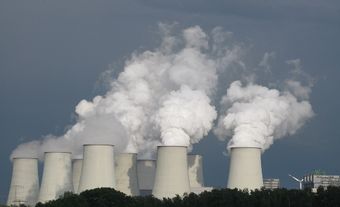Nationalization
Nationalization is the takeover of ownership and control of a privately owned enterprise by the STATE. States have traditionally taken private property for public purposes, eg, land for construction of roads; but this "right of eminent domain" is in contrast to nationalization, which is often carried out in pursuit of economic, social or political policies, eg, to increase Canadian ownership in the petroleum industry through the takeover of foreign oil companies by the federal crown corporation PETRO-CANADA.
Whether it is justified for pragmatic reasons, eg, the provision of an essential service, or for broader collectivist goals, such as ECONOMIC NATIONALISM, nationalization infringes on the liberal tenets of the security of property and reliance on the market. The state uses or threatens to use its power to obtain property either by expropriation, with or without compensation, or by acquiring property in a sale by using pressure and excluding other purchasers. Although compensation may be prompt and fair, the threat of coercion may reduce the value of property, and the state always claims to be the final arbiter.
When a state nationalizes the holdings of foreign investors, the position of Western industrialized countries (especially the US) is that nationalization is only justified after prompt and adequate compensation, determined by an impartial authority. However, developing countries, in which there is often great resentment of foreign control, argue that states have perpetual sovereignty over their own resources and have the right to nationalize in order to further economic self-determination and economic development. They claim that nationalization and compensation are subject only to the laws of the nationalizing country - a position embodied in resolutions of the United Nations General Assembly, including Resolution 1803 of December 1962. Nonetheless, nationalization is usually accompanied by compensation in recognition of fairness and of the need to maintain the confidence of foreign investors.
Although Canada generally supports the ideology of free enterprise, the concern about extent of foreign ownership and control of Canadian resources prompted nationalizations during the 1970s, particularly by NEW DEMOCRATIC PARTY governments in BC, which between 1972 and 1974 nationalized a number of firms in the forest-products industry; and the NDP government in Saskatchewan which in 1975 announced that it would nationalize at least 50% of the potash industry. Throughout the decade, the federal Liberal government proposed "Canadianization" of the oil industry, a policy which culminated in the NATIONAL ENERGY PROGRAM of 1980. Canadianization does not necessarily mean nationalization, since it includes the purchase of foreign firms by private Canadian companies. Moreover, state control was achieved by purchase, involving little coercion. Nonetheless, critics claimed that government measures distorted market values and resulted in inappropriate compensation.
The spate of nationalizations and a general reaction against the increasing role of the state in the economy resulted in a countermovement to reduce government involvement and to denationalize or "privatize" government enterprises. The movement to return operations, especially commercial functions, to the private sector found its fullest expression in the United Kingdom where the Conservative government of Margaret Thatcher conducted an ambitious privatization program beginning in 1979.
In Canada, the privatization of the BC Resources Investment Corporation by the BC Social Credit government attracted considerable attention. Privatization initiatives continued at the provincial level, most dramatically in British Columbia in 1987 when the Social Credit government under William VANDER ZALM announced a broad program to transfer functions from the government to the private sector.
Federally, privatization was espoused by the short-lived Progressive Conservative government of Joe CLARK, but its commitment to privatize Petro-Canada contributed to its defeat in 1980. However, the election in 1984 of a new Progressive Conservative government under Brian MULRONEY marked a return of the objective of privatization. The government established a privatization secretariat to select companies for and to carry out privatization, either by sale of the company to an existing private-sector entity, or by general sale of shares to the public. Between 1984 and 1988 the Mulroney government privatized a number of crown entities, including Canadian Arsenals Limited, CANADAIR, DE HAVILLAND, and Teleglobe Canada. The trend rapidly spread through the 1990s, especially under the provincial regimes of Ralph Klein in Alberta and Mike Harris in Ontario, and was not reversed even with the ascent of the Liberals in 1993.

 Share on Facebook
Share on Facebook Share on X
Share on X Share by Email
Share by Email Share on Google Classroom
Share on Google Classroom


